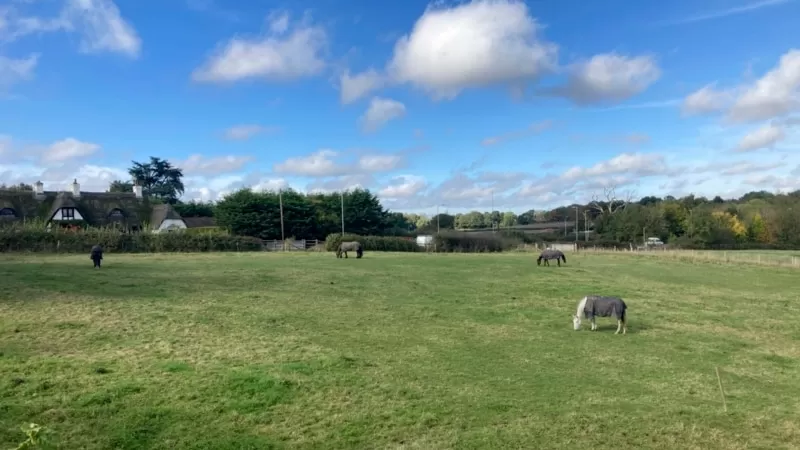Abbots Langley, a quaint English village located 30 kilometers northwest of London, is a place steeped in history. Its picturesque streets are lined with centuries-old buildings, including a 12th-century church and a circular courtyard of rustic thatched-roof cottages. The village is also home to the Tithe Barn, a 600-year-old structure originally built to store crops from peasant farmers. Today, the Tithe Barn has been converted into homes, preserving its rich history. However, the village is now facing a new challenge – a proposed data center development next door.
The proposal to build a data center on a field across the road has been met with fierce opposition from the residents of Abbots Langley. And for good reason. The data center would not only strain local resources but also create noise and traffic that would damage the character of this quiet village. The residents, who number over 20,000, are determined to protect their home and are fighting to stop the development.
Their efforts have been successful so far, with the local authorities rejecting the proposal. However, the developers are getting a second chance from the British Prime Minister Keir Starmer’s government, which is pursuing reforms to boost economic growth after the Labour party’s election victory in July. This has sparked a new wave of concern among the villagers.
The proposed data center would be built on “greenbelt” land, which has been set aside to prevent urbanization. This has raised questions about the impact it would have on the environment and the local community. The residents fear that the data center would not only disrupt their peaceful way of life but also harm the natural beauty of the village.
The controversy surrounding the data center projects in Abbots Langley and two other locations in Buckinghamshire, west of London, has highlighted the clash between business considerations, national priorities, and local interests. The British government has designated data centers as “critical national infrastructure” in its plans for economic growth, and this has led to a push for their development. However, the residents of Abbots Langley and other affected areas are concerned about the impact these data centers would have on their communities.
Deputy Prime Minister Angela Rayner has stepped in to review the appeals filed by the developers after their proposals were rejected by the local authorities. This has taken the decision out of the hands of town planners and has sparked hope among the residents. The first decision is expected by January, and the villagers are eagerly awaiting the outcome.
The proposed data center in Abbots Langley is planned to be built on a field currently used to graze horses. It is bordered by affordable housing and a highway, which raises concerns about the impact it would have on the local infrastructure. The developers have promised to create up to 260 jobs, but the residents are skeptical. They believe that the data center would be heavily automated and would not require a large workforce. This has raised doubts about the promised economic benefits for the community.
One of the biggest concerns about data centers is their environmental impact. The huge amount of electricity they require is a major cause for concern. The proposed data center in Abbots Langley would draw 96 megawatts of “IT load.” This has raised concerns among experts, such as James Felstead, director of a renewable energy company and a resident of the area. He believes that the local power grid would not be able to handle such a high demand for electricity.
This is a problem that is not unique to Abbots Langley. Across Europe, data centers are facing scrutiny over their environmental impact. The demand for data centers is expected to triple by the end of the decade, and this has raised concerns about their ecological footprint. In some places, such as Ireland and northern Virginia, there have been protests and restrictions imposed on data centers. This highlights the growing awareness about their environmental impact and the need for sustainable solutions.
However, not everyone in Abbots Langley is opposed to the data center development. Some, like retiree Bryan Power, believe that it would bring economic benefits to the area. He compares it to another big project in the village, the Warner Bros.’ Studio Tour featuring a Harry Potter exhibition. Power believes that the data center would bring jobs and boost the local economy.
The controversy surrounding the proposed data center in Abbots Langley has sparked a larger conversation about the future of data centers and their impact on local communities. As the world becomes increasingly reliant on technology, the demand for data centers will continue


